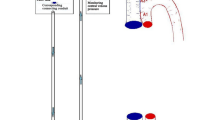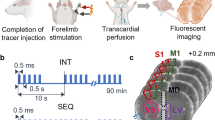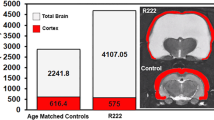Abstract
NEURONAL activity is dependent on the ability of nervous tissue to control the concentration of electrolytes across the nerve cell membrane. The most important component of this process is the active extrusion of sodium from the neuronal cytoplasm against an osmotic gradient. A nerve impulse is normally initiated by the production of an area of increased permeability on the cell surface which allows the outward flow of potassium ions and the inward flow of sodium ions1. After the passage of the impulse, energy is required to restore the electrolyte distribution associated with the resting polarized state1. Nerve impulses can also be initiated by altering the electrolyte content of the fluid surrounding the neurone. Electrolyte disturbances occur in oedematous brain following trauma and cold injury and have been studied in detail by Pappius and Gulati, but in such conditions the mechanism of water accumulation and other ionic changes are not known2. The following experiments were carried out on anoxic-ischaemic brain damage in rats3 in order to investigate the role of changes in the electrolyte and water content of the brain in the production of the hemiplegia and convulsions which occur in this condition, and their relationship to cerebral protein synthesis and energy production.
This is a preview of subscription content, access via your institution
Access options
Subscribe to this journal
Receive 51 print issues and online access
$199.00 per year
only $3.90 per issue
Buy this article
- Purchase on Springer Link
- Instant access to full article PDF
Prices may be subject to local taxes which are calculated during checkout
Similar content being viewed by others
References
Hodgkin, A. L., and Huxley, A. T., J. Physiol., 117, 500 (1952).
Pappius, H. M., and Gulati, D. R., Acta Neuropathol., 2, 451 (1963).
Levine, S., Amer. J. Pathol., 44, 531 (1960).
Schales, O., and Schales, S. S., J. Biol. Chem., 140, 879 (1941).
Spector, R. G., Brit. J. Exp. Pathol., 42, 623 (1961).
Spector, R. G., J. Pathol. Bact., 90, 533 (1965).
Atkinson, J. N. C., and Spector, R. G., Brit. J. Exp. Pathol., 45, 393 (1964).
Spector, R. G., Guy's Hosp. Rep., 113, 305 (1964).
MacDonald, M., and Spector, R. G., Brit. J. Exp. Pathol., 44, 11 (1963).
Yap, S-L., and Spector, R. G., Brit. J. Exp. Pathol., 46, 422 (1965).
Yap, S-L., and Spector, R. G., J. Pathol. Bact., 90, 543 (1965).
Ramsey, A., Yap, S-L., and Spector, R. G., J. Pathol. Bact. (in the press).
Hills, C. P., Amer. J. Pathol., 44, 531 (1964).
Hills, C. P., and Spector, R. G., Nature, 199, 393 (1963).
Seller, M. J., and Spector, R. G., Nature, 198, 489 (1963).
Mott, J. C., Brit. Med. Bull., 17, 144 (1961).
MacIlwain, H., Biochemistry of the Central Nervous System (J. and A. Churchill, 1955).
Author information
Authors and Affiliations
Rights and permissions
About this article
Cite this article
YAP, SL., SPECTOR, R. Cerebral Composition and Function in Experimental Brain Injury in the Rat. Nature 216, 698–702 (1967). https://doi.org/10.1038/216698a0
Received:
Issue Date:
DOI: https://doi.org/10.1038/216698a0
Comments
By submitting a comment you agree to abide by our Terms and Community Guidelines. If you find something abusive or that does not comply with our terms or guidelines please flag it as inappropriate.



